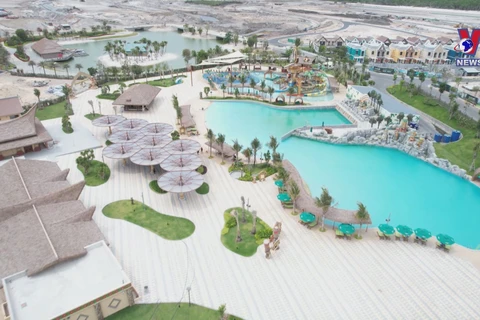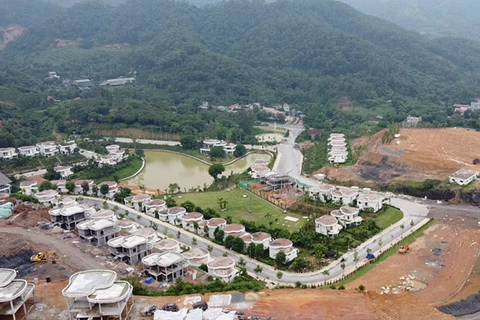 Several high-quality hotels and resorts in the country are doing exceptionally well. (Photo: Vinhomes)
Several high-quality hotels and resorts in the country are doing exceptionally well. (Photo: Vinhomes) Hanoi (VNA) – Experts have noted their hope that coastal resorts will play a role in accelerating the recovery and development of the domestic resort real estate market which is facing an array of challenges.
Mauro Gasparotti, Director of Savills Hotels, said Vietnam’s hospitality market had great momentum before the pandemic, moving from a destination only for experienced travellers, to a place for holiday and leisure travellers.
“However, development outpaced demand, and now we are dealing with the consequences of overdevelopment like incomplete or underperforming projects,” he pointed out.
“On a positive note, several high-quality hotels and resorts in the country are doing exceptionally well, and they will keep doing so for the foreseeable future. Projects that have been properly implemented and are correctly managed will recover faster,” Mauro continued.
He said tourism faces difficulties such as inflation, global political tensions, raised airfares and labour shortages.
In Vietnam, recovery is fragmented, he said. Ho Chi Minh City, for example, has experienced significant recovery with occupancy fast reaching 2019 levels. However, properties in Nha Trang and Da Nang are still struggling to improve performance. Operating margins in these areas are -40% to -60% lower than in Bali and Phuket.
Fenady Uriarte, Business Development Manager, Southeast Asia of STR, added “While Southeast Asia’s RevPAR for February YTD 2023 moves closer to 2019 levels at -3.6%, Vietnam’s overall RevPAR is still -33.4% behind.”
“However, ADR is moving in the right direction. As we look ahead, key source markets reopening, such as China and Japan, could present an upside for Vietnam.”
Many hotel developments are delayed or on hold because of tightened credit controls. However, the conversion of existing developments shows that many hotel owners are looking to collaborate with chain brands. Owners of independent hotels and chains are increasingly attracted to the opportunity to benefit from the scale, expertise, and network of global hotel operators.
Millennials make up 30% of Vietnam’s population and are shaping the travel landscape. Norbert Vas - COO of Archipelago Indochina shared “I am both concerned and optimistic about this sector in Vietnam.
Concerned about where big operators are taking the concept, but optimistic because there is vast local talent and creativity and a burgeoning young domestic class of sophisticated travellers who would gladly embrace the lifestyle concept if executed correctly.”
Speakers from QUO Global, Dulux Professional, IHG Hotels & Resorts, SOHO Hospitality and Delivering Asia Communications discussed the latest industry movements such as colour trends, hotel conversion, luxury dining, and the power of branding and media communications.
According to Savills Hotels, in the next three years, forecasts expect significant growth in the luxury hotel segment. While luxury rooms currently have 2% of the total supply, they have 5% of the pipeline.
Luxury branded residences are increasingly popular in Vietnam. International property branding expert Anthony Moulton, Managing Director at Brand & Co said, “Time and space is the new luxury.”
Ultra-high-net-worth (UHNW) and high-net-worth (HNW) buyers want branded residences that buy them time and a home that gives them space, think Super Prime real estate where size matters.
True luxury is about creating a space for the mind (in a philosophical sense, creating time). It has to do with the quality of space, services, amenities, light and air, rather than just expensive materials.
When branding and marketing these types of projects, Moulton said “Prestige and status are still the two largest factors that make people buy luxury branded residences and luxury goods”.
Hotels are reshaping the look, feel and appeal of their properties, using exterior and interior designs as one of their differentiating methods to create unique experiences./.























